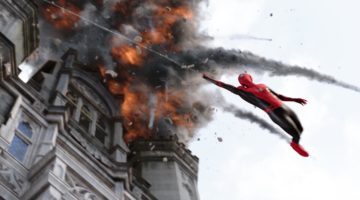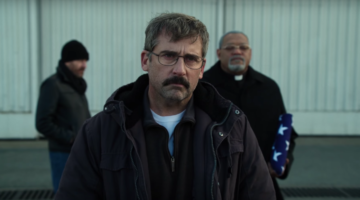Movie Review: In Darkness
Instantly captivating and ever-engrossing, In Darkness¸ a Polish film that retells a harrowing true-life story of Jews hiding from persecution in the Nazi-occupied city of Lvov, is a quintessential tale of human survival, loss of innocence, and the struggle between one’s better angels and darker demons.
The audience first meets the man who would be hero, Leopold Socha, robbing a house with his partner in crime. He returns to make loves to his wife in a small apartment, and the next day he travels beneath the streets where he makes a meager living as a sewer worker. Ever an opportunist, stealing and then selling items to create a manageable world for his family, Socha comes across several plotting Jewish men who prepare an escape when the time comes.
Socha forgoes the reward money for turning them in, and soon after a Nazi raid, dozens take to the sewers to seek refuge. Socha cannot help everyone; he plucks three patriarchs of the group to decide which dozen people will be taken to a more secure hiding place, and which will be left to fend for themselves.
The group endures months and months of cold, damp sewer living, or lack thereof, eating onions, avoiding intrusive soldiers, and putting their faith, and money, in the brusque and self-serving Catholic.
Directed by Agnieszka Holland, and based on the book by Robert Marshall, In Darkness is immediately engrossing, beginning a journey of both the beauty and brutality of life. It is a story set in a time and place that has often been told on the big screen, but when done well, as in this case, is powerful and worth experiencing.
It is not merely one of the best foreign films of 2011, for which it has received an Academy Award nomination, but should be regarded as one of the best films anywhere of the past year.
The palette of whites, blacks, and grays offer a dreary atmosphere, fitting for a time of dark despair. There are few other colours that adorn the screen, but both offer significant symbolism.
Krystyna Chiger (Milla Bankowicz), the young girl who grows sings and dances, casually disregards scurrying rats, and knows little but a sewer existence and is thus the most optimistic of the group, wore bright blue boots while forced below the surface. The only other bright addition to the film is that of the crimson blood spilt on the snow, and the streets of Lvov from the innocent and the criminal.
Socha, played impeccably by Robert Wieckiewicz, is not a one-dimensional static figure. He struggles to risk the safety of his family for a dozen strangers, but disparages his partner when he chooses it is too risky for him, and leaves Socha to work alone. He is in the game for the money, and for his family, but he is human, and as his wife simply declares, “The Jews are just the same as us.” In one of the most moving scenes, one shown in the trailer and on the movie poster, Socha takes young Krystyna above ground, ever briefly, to see the light.
The film evokes powerful emotions through simplicity and pith. Wherein the beginning, dozens of people flee to the tunnels, and faces and voices blend with one another, the audiences becomes increasingly familiar and impassioned. Agnieszka Grochowsha, one of the finest actresses in Poland, and Benno Fürmann, known as ‘pirate,’ cunning and daring like Socha, are superbly compelling, both hopeful and steadfast.
There is never a moment that is drowned out by melodrama; the expert direction, the atmosphere, and the pacing of the movie (that doesn’t feel lengthy at 145 minutes), command the audience to be completely immersed in this world where they too feel the cold of a Polish winter, hear the invasive rats, and hold their breath at every sign of danger. Death lingers at every moment, both for those below and above the surface, but life is not given up so easily, as those who know the value of it, know that it is worth fighting for.
[star v=45]










